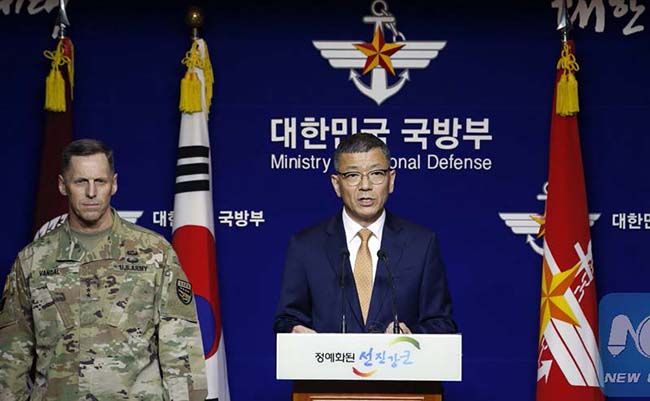SEOUL - South Korea and the United States on Friday announced their final decision to deploy the Terminal High Altitude Area Defense (THAAD) in the U.S. Forces Korea (USFK) despite continued oppositions from neighboring countries.
The military authorities jointly made an official announcement to deploy the advanced U.S. missile defense system in the USFK stationed on the Korean peninsula to tackle the Democratic People' s Republic of Korea (DPRK)'s nuclear and missile threats.
Seoul and Washington reportedly aim to deploy one THAAD battery by the end of next year, which would be operated by the allied forces under the operational control of the USFK commander. A THAAD battery is composed of six mobile launchers, 48 interceptors, airborne radar and fire control system.
The site for the deployment would be announced within weeks. Potential candidate sites are known to be Pyeongtaek in Gyeonggi province, Wonju in Gangwon province, Eumseong in South Chungcheong province, Chilgok in North Gyeongsang province and Gunsan in North Jeolla province.
The final decision came despite continued oppositions from China and Russia, which have opposed to the THAAD deployment on the Korean peninsula as the U.S. missile defense system far exceeds South Korea's actual defense needs and would directly threaten the strategic security of the two countries.
China's foreign ministry said in a statement Friday that the Chinese side is strongly dissatisfied with and firmly opposes to the deployment of THAAD in South Korea.
The Seoul defense ministry allegedly notified its neighboring countries, including China and Russia, of its final decision to deploy the U.S. missile defense system on Thursday afternoon.
The joint statement said that if the THAAD is deployed on the Korean peninsula, it will not target any other third country but will be operated only in response to the DPRK's nuclear and missile threats. (Xinhua)
Home » World » S. Korea, U.S. Decide to Deploy THAAD in U.S. Forces Korea
S. Korea, U.S. Decide to Deploy THAAD in U.S. Forces Korea

